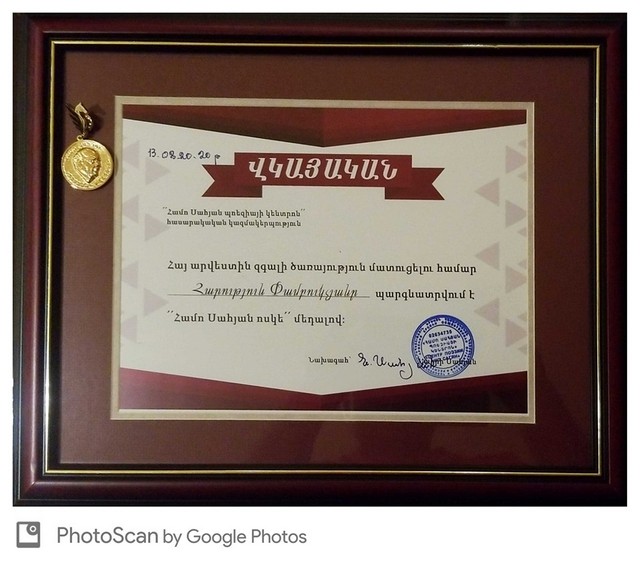by Melody Seraydarian
You can say whatever you want about Armenian culture, but our music is objectively good: plain and simple. Discotchari understands this undeniable truth and has created an online community of musicophiles, Armenian history buffs and everyone in between.
Let’s first unpack the name. You may have picked up on it already, but Discotchari is a clever blending of “disco” – simply put, dance music – and “kochari” – if you read the Weekly, you know what this is. They came up with this amazing name off of an Armenian song from the 80s where “disco..tchari, disco…tchari” is being chanted in the background.
Read also
Discotchari is a sublabel under Critique, an LA-based electronic label that selector and A&R Zach Asdourian and DJ and marketing professional Anaïs Gyulbudaghyan started in 2020 (yes, at the peak of the pandemic). Discotchari is “focused on reconstructing a long lost back-catalog of rare groove music from artists of all these identities, becoming an archive where these songs will be rediscovered by future generations of listeners.”
“I’ve always had a fascination with old music from a wide variety of genres, especially Armenian, and Discotchari is meant to be a follow up to the Armenian compilation we put out on Critique,” explains Asdourian. “I wanted to keep releasing Armenian music, but I didn’t want to do it through Critique. Discotchari filled the gap for the time, energy and ideas to finally materialize.”
Asdourian fell in love with music while growing up in Southern California – the de facto capital of the Armenian Diaspora. He picked up the guitar at a young age and through it, discovered other genres, ranging from classic rock and punk to acoustic and world music, finally settling and becoming fully immersed in electronic music. Then, five years ago, he began working at a talent agency, where he learned about everything that happens behind the scenes of an artist’s career.
“The more I learned about this aspect of the music industry, I realized this is where my talents were,” says Asdourian. “I could help artists with their final product.”
Enter Gyulbudaghyan. Growing up in Armenia with her father who played in a rock band, the studio was her second home. She was fully involved in his world, helping out at festivals and even stage management. As her curiosity of the music sphere grew, Gyulbudaghyan fell in love with electronic music and its relationship with other genres and how it can be incorporated. She has been spinning tracks as a DJ for 12 years and counting.
“I’m a DJ, but I was playing electronic and techno style sets,” says Gyulbudaghyan. “I’ve always had a passion for Armenian music, and when we decided to start this together, we understood that there was a need for it…a separate entity.”
Through Discotchari, the duo is able to blend their extensive joint knowledge of how to run a record label and how to make music. And they’re doing an outstanding job.
“From the very beginning, we didn’t anticipate the reception we received,” says Gyulbudaghyan. “I really do think it was exciting for a lot of people. When we first launched it, we did a livestream of a set that we played, and initially, the idea was that we wanted to play Armenian music, and we didn’t have the medium nor the name to do that. Thus, Discotchari was born.”
The two have visited multiple states and countries on the hunt for Armenian records. With five languages between them, they have discovered Armenian records displayed as being Russian or French. They have road tripped to San Francisco, discovering Armenian gems in non-Armenian record stores. Their backgrounds – Asdourian from the Diaspora and Gyulbudaghyan from Armenia – play a key role here, as they appreciate and highlight music from both halves of the Armenian identity on Discotchari.
“Growing up in Southern California, my idea of Armenian music is different from that of Anaïs’ [Gyulbudaghyan]. I was exposed to it at picnics associated with the Armenian church or organizations. It was essentially a mix of Harout Pamboukjian and Paul Baghdadlian over and over again,” recalled Asdourian.
“I didn’t know until after college that there was more out there. I discovered Soviet Armenian artists that had music released on the Melodia label. It took me 20 years to find that whole aspect of it. In the last two years, I discovered Armenian music from South America…records that were even released in Istanbul after the Genocide, records released all over France, not just in Paris, records released in Massachusetts, New Jersey and Detroit. It just goes on.” He takes a pause and adds, laughing, “Basically, if a church was built, that’s a pretty good marker that there was a community there. You would absolutely have a community with a demand for music.”
With tensions brewing in Armenia and emotions running high, Discotchari understands the power of music and what it can do for a grieving nation.
“Music is very reactionary. When you think of moments in time…moments in history, there is always a song that accompanies it,” says Asdourian. “For Armenian people, music is a source of morale, and I hope Discotchari provides them with just that.”

























































